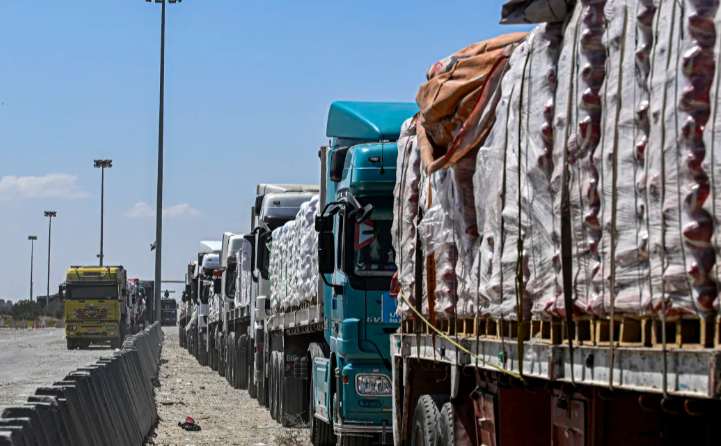
Egyptian trucks carrying humanitarian aid bound for the Gaza Strip queue outside the Rafah border crossing on the Egyptian side on March 23, 2024. (Credit: Khaled Desouki/AFP)
On May 7, Israeli tanks rolled into eastern Rafah, seizing control of the Palestinian side of the sole border crossing between Egypt and the Gaza Strip. All at once, Israeli forces opened a new front, cut off incoming aid, and forced already displaced Palestinians to flee yet again under the threat of a full-scale offensive in Rafah.
The interruption of food, fuel, and medical aid to the Gaza Strip caused an immediate international outcry. “The closure of both the Rafah and Kerem Shalom [Karem Abu Salem] crossings is especially damaging to an already dire humanitarian situation,” UN Secretary-General Antonio Guterres said. “They must be reopened immediately.”
Israel claimed to have reopened the Kerem Shalom crossing on May 9, however, the United Nations countered saying no aid has entered Gaza and that there are no personnel to receive it on the Palestinian side due to Israeli military operations.
The Rafah crossing was also the only way for critically injured Palestinians to leave and receive international medical treatment. Ezzedine Chahine, an anesthesiologist at al-Aqsa Martyrs Hospital in Gaza, told L'Orient Today about the effects of the crossing’s closure.
“In the past, the Rafah crossing was still open and a few cases, very few in number, especially the most delicate ones, were able to leave the enclave to be treated. There were delegations from several organizations and countries, medical teams and others, supporting us in our work. They brought us medical equipment and certain medicines,” Chahine said. “That's all over now. The Rafah crossing has been closed: No one can get in or out.”
Friday marked one month since Gaza’s most important gateway with the outside world was shut down, and it remains closed, with diplomatic efforts having had no effect.
Negotiations between Israel and Hamas, which include reopening the Rafah border crossing, have been intensifying amid international pressure for a cease-fire. U.S., Egyptian and Israeli officials met last Sunday to discuss reopening the crossing, Axios reported. However, they failed to make any progress on the matter after the Israeli delegation refused to allow any role for the Palestinian Authority in operating the crossing, according to four U.S. and Israeli officials.
Between May 7 and May 28, an average of just 58 aid trucks entered Gaza daily, as opposed to 176 per day in April, the United Nations Office for the Coordination of Humanitarian Affairs (OCHA) reported. The United Nations agency for Palestinians refugees in the region (UNRWA) has repeatedly stated that 500 trucks per day is the minimum requirement to meet basic humanitarian needs in Gaza.
Thousands of aid trucks have been stuck on the Egyptian side of the crossing since May 7, their loads of fresh produce rotting in the scorching sun.
“Apples, bananas, chicken, and cheese. A lot of things have gone rotten,” said truck driver Ahmoud Hussein in an interview with Al Jazeera. “I am sorry to say that even the onions we’re carrying will at best be eaten by animals because of the worms in them.”
Minimal aid trucks entering the Gaza Strip coupled with the destruction of storage warehouses in and around Rafah have exacerbated the ongoing famine. A United Nations report released on Wednesday stated, “Over one million people – half the population of Gaza – are expected to face death and starvation by mid-July.”
With the crossing closed, the situation in Rafah and all of Gaza “is as dire as it’s ever been,” Louise Wateridge, a spokesperson for UNRWA told the Washington Post. “It’s not just that people don’t have things,” she said. “Everyone there knows there is no food coming.”